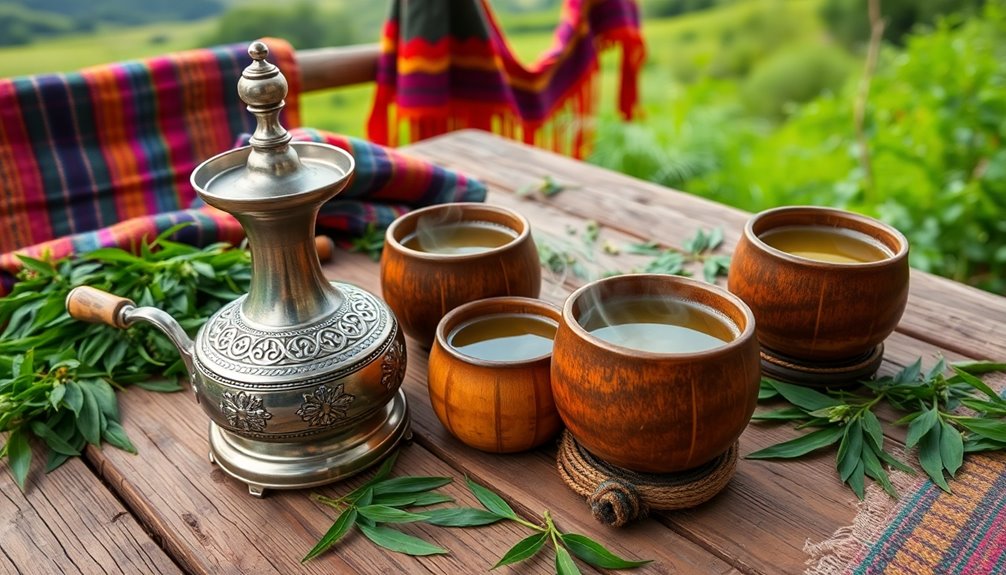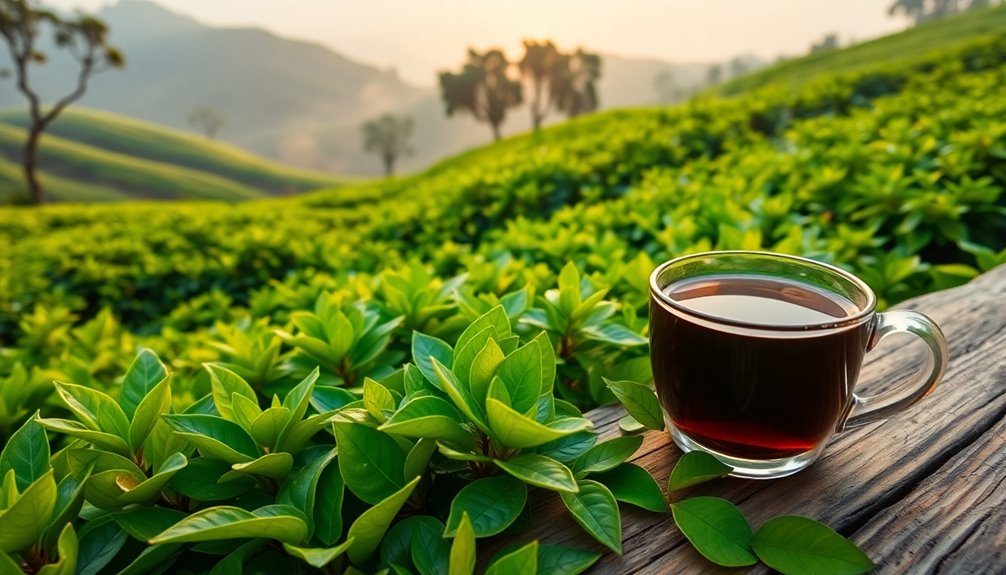If you're curious about caffeine in black tea, you've come to the right place! Black tea typically has about 20-30mg of caffeine per cup, depending on how long you steep it. Steeping for 2-3 minutes gets you a moderate amount, but going longer—up to 7 minutes—can double that! Remember, the temperature of the water and the number of leaves you use also affect the caffeine level. Black tea isn't just about caffeine; it has health benefits too, like supporting heart health and boosting metabolism. Stick around, and you'll uncover more fascinating details about this popular beverage!
Key Takeaways
- Black tea contains an average of 20mg of caffeine per 100g, which is less than coffee's 40mg per 100g.
- Steeping time and water temperature significantly influence caffeine content, with longer steeping yielding up to 60mg per cup.
- Caffeine sensitivity varies by individual, affecting how black tea consumption impacts sleep and energy levels.
- Black tea is rich in flavonoids and antioxidants, providing health benefits alongside its caffeine content.
- Herbal teas are caffeine-free alternatives for those looking to avoid caffeine while enjoying a warm beverage.
Introduction

When you think of caffeinated beverages, black tea often comes to mind as a popular choice. Made from the Camellia sinensis plant, black tea has a caffeine content that averages about 20mg per 100g. While this is lower than coffee, which has around 40mg per 100g, it still packs a nice boost!
The caffeine level can change based on brewing methods. For instance, steep time and water temperature play a big role in how much caffeine you get from each cup.
If you're caffeine sensitive, be mindful of when you drink black tea. Having a warm beverage in the evening might disrupt your sleep if you react strongly to caffeine.
On the other hand, if you prefer to avoid caffeine altogether, herbal teas like chamomile are great alternatives. They let you enjoy a soothing drink without the jitters!
Origin of Black Tea

Black tea has a fascinating history that traces back to the 17th century in England, where it gained popularity due to its bold flavor and energizing effects. This delicious drink originated from the process of oxidizing tea leaves, which began in China. As the technique spread, it influenced tea production around the world.
By the 17th century, the British East India Company began importing black tea to Europe, making it a sought-after beverage. The robust flavor and stimulating properties quickly won over tea drinkers in England.
Over time, India emerged as the leading producer of black tea, accounting for more than half of the world's total tea production.
As black tea became more popular, traditional blends like English Breakfast and Earl Grey were developed to cater to Western tastes. These blends combined unique flavors and aromas, making them favorites among tea enthusiasts.
Today, black tea continues to be enjoyed globally, with its rich history and diverse varieties adding to its charm. So, the next time you sip a cup, remember the journey it took from the 17th century all the way to your hands!
Caffeine Varies by Steep Time

Caffeine levels in black tea can significantly vary based on how long you steep it. If you steep your tea for just 2-3 minutes, you'll get about 20-30 mg of caffeine per cup.
But if you let it brew for 5-7 minutes, that amount can jump to around 40-60 mg! So, the longer the steeping time, the more caffeine you'll extract from the tea leaves.
Water temperature also plays a role. Using hotter water can enhance caffeine extraction, resulting in a stronger cup of tea.
If you're aiming for that extra boost, keep your water temperature in mind while brewing. Plus, the amount of tea leaves you use matters too. More leaves equal higher caffeine levels when steeped.
Health Benefits of Black Tea

Discovering the health benefits of black tea can be an exciting journey for your wellness routine. Black tea, with its moderate caffeine content, offers more than just a pleasant flavor. It's rich in flavonoids, which can help improve cholesterol levels and support heart health.
Regularly sipping on black teas may also reduce oxidative stress, thanks to their high antioxidant content.
But that's not all! Studies show that black tea can enhance gut health by promoting the growth of beneficial gut bacteria. Enjoying a moderate amount, up to 5 cups daily, is safe and can be quite beneficial for your overall health.
If you're looking to manage your weight, you might be pleased to know that some research suggests black tea can boost your metabolism, aiding in weight management. Additionally, the presence of antioxidants in black tea may help reduce inflammation and support overall wellness.
Caffeine Sensitivity Varies Greatly

Understanding your body's response to caffeine is essential, as sensitivity can vary widely from person to person. Some individuals feel energized after just a small cup of black tea, while others may drink several cups without feeling a thing. This difference in caffeine sensitivity often comes down to genetics, which affects how quickly your body processes caffeine.
If you're a regular caffeine consumer, you might notice that you develop a tolerance over time. This means you could need more caffeine to feel the same stimulating effects that occasional drinkers experience with less.
Other factors, like body weight, overall health, and lifestyle choices, can also influence how caffeine affects you.
For instance, if you experience hormonal changes, such as during pregnancy, your caffeine sensitivity might increase. This could lead to feeling jittery or anxious, even after small amounts of caffeine.
Practical Applications

When it comes to incorporating black tea into your daily routine, knowing your caffeine sensitivity can help you make informed choices. Black tea typically has a caffeine content of 60-90 mg per 8 oz cup, so understanding how this affects you is key.
If you enjoy your tea in moderation—up to 5 cups a day—you can reap its health benefits without excessive caffeine intake.
Consider the tea varietal you choose, as different kinds can have varying caffeine levels. If you're looking for a stronger brew, brewing time matters! Steeping your loose leaves longer extracts more caffeine, making your cup even more potent.
Be mindful of your sleep patterns too. If you're sensitive to caffeine, it's best to enjoy your black tea earlier in the day. That way, you won't disrupt your sleep later on. Additionally, incorporating herbal tea into your routine may provide caffeine-free alternatives for hydration and relaxation.
Frequently Asked Questions
Is There a Lot of Caffeine in Black Tea?
There's moderate caffeine in black tea. An average cup contains about 45 mg, which is less than coffee. Factors like brewing time and tea type can affect the caffeine level, so it varies.
Does Caffeine From Tea Affect You Differently?
Yes, caffeine from tea affects you differently. It often provides a gentler boost due to lower levels and the calming l-theanine. Your individual tolerance and brewing methods can also change how it impacts you.
How Do You Get the Most Caffeine Out of Black Tea?
To get the most caffeine from black tea, use hot water around 200°F, steep for 4-5 minutes, add about 2 teaspoons of leaves, and opt for robust varieties like Assam for a stronger brew.
Which Tea Is Highest in Caffeine?
If you're looking for the highest caffeine content in tea, black tea's your best bet. Varieties like Assam and chai often pack more caffeine than other types, giving you that extra boost you might need.
Conclusion
In conclusion, black tea offers a delightful way to enjoy a boost of caffeine while also reaping health benefits. Remember, the caffeine content can change based on how long you steep your tea, so experiment to find your perfect brew. If you're sensitive to caffeine, pay attention to how your body reacts. With its rich flavors and energizing qualities, black tea can be a wonderful part of your daily routine. So, brew a cup and enjoy!










